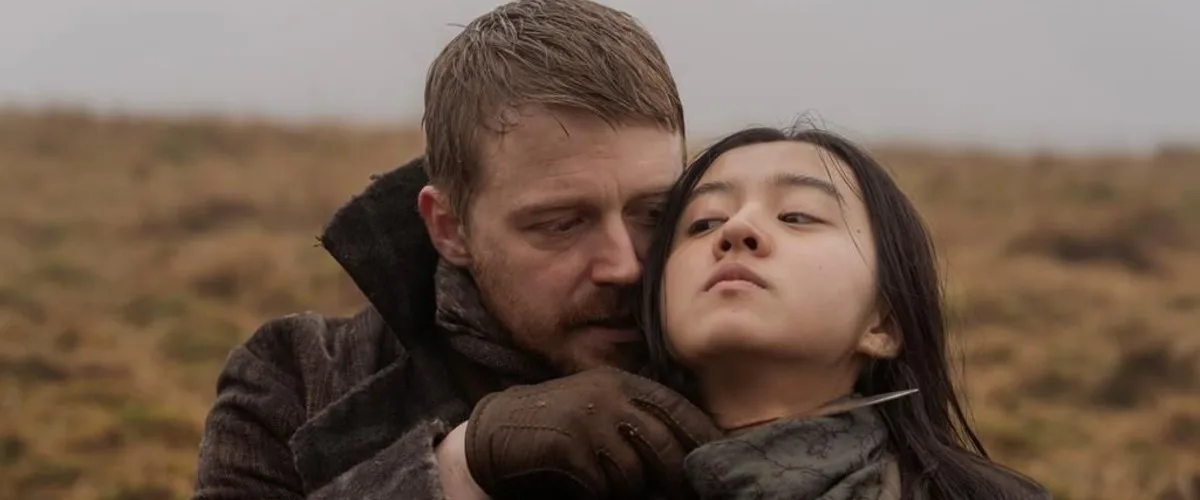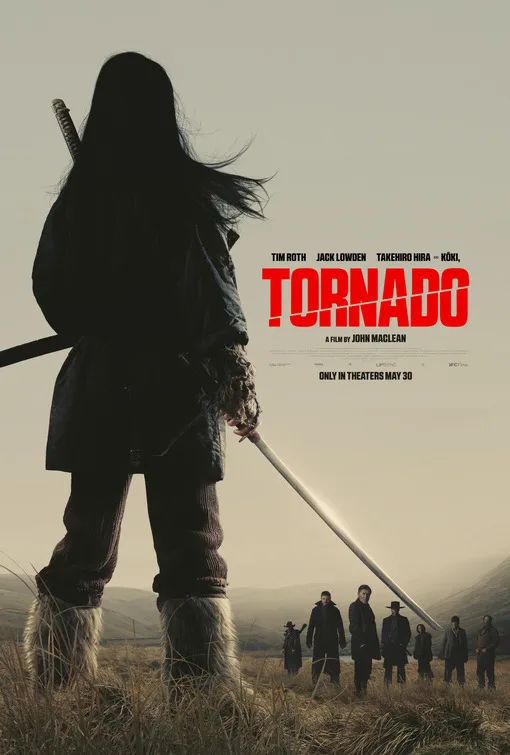You’d be forgiven if you glanced at the monotonous western “Tornado” and decided that it’s a handsome genre exercise. The movie, which was shot in Scotland and set in 1790s Britain, follows a handful of laconic characters as they chase after each other for the usual formulaic reasons: gold and revenge. Writer/director John Maclean (“Slow West”) reteams with director of photography Robbie Ryan (“Poor Things”) for a typically attractive collaboration, which makes “Tornado” easy enough on the eyes. That helps considerably whenever the action lets up in this dialogue-light chase movie.
Substantive themes are hinted at throughout, though they’re most clearly (and bluntly) articulated in the movie’s load-bearing dialogue between the title heroine (Kōki), a samurai-sword-wielding teenager, and her father Fujin (Takehiro Hira), a traveling puppeteer. By contrast, Tim Roth and “Slow Horses” star Jack Lowden, playing a father/son duo of scruffy bandits, don’t say much that sticks in one’s mind.
“Tornado” also features a number of eye-popping images thanks to the filmmakers’ emphatic use of forced perspective. The movie may not deliver enough of what its creators offer, but to paraphrase the great Bugs Bunny during a rare self-justifying apology: So it’s mechanical!
Maclean’s latest—his first feature in ten years—begins mid-chase. The title character flees from vicious robber Sugarman (Roth) and his gang, whose members have Dick Tracy-esque names like Squid Lips (Jack Morris) and Lazy Legs (Douglass Russell). Sugarman’s looking for Tornado and a cache of gold; Sugarman’s son, Little Sugar (Lowden), mostly skulks about and looks for opportunities to prove himself. He finds one in Tornado, though he mostly hangs back and lets his dad and his associates go first.
Meanwhile, Tornado tries to resume her uneasy day-to-day routine with her father, whose home-spun wisdom falls on deaf ears. Admittedly, it’s hard to take seriously folksy dialogue like, “Learn patience. Know when to move and when to wait.” This might have been more endearing coming from the Teenage Mutant Ninja Turtles’ talking rat mentor Splinter. It’s less impressive coming from a major supporting character who seems to speak for Maclean, like when Fujin, speaking in character as one of his marionettes during a puppet show, explains why we never really learn why Sugarman and his group do what they do since they’re motivated by “the most evil of all reasons—no reason at all.”
Tornado, the daughter of a Japanese man and an absent European mother, only has a little more on her mind. Sugarman’s pursuit triggers her fight-or-flight instincts, and she has no time for her life-lesson-dispensing father. Tornado also happens to live in changing times, when immigrants are still treated like curious anomalies, and swords will soon be replaced with guns. A number of other qualities and storytelling values remain constant, as Maclean suggests when Fujin explains that puppet show audiences “always cheer when evil is winning.” It’s hard not to agree with Tornado when she snarks back: “Because good is boring.”
Then again, Maclean’s right to emphasize the ScottishBritish countryside, both as an eye-catching backdrop and contextualizing environment, since it often dwarfs his human characters and makes them look small or absurd. Many times, the deep focus of any given static camera setup establishes how far the characters have traveled to get from one in-between place to the next. Other times, it serves to show how close together the characters actually are, since they’re just over there, one straight, semi-symmetrical line of sight apart from each other. So it’s very easy to catch a melancholy mood and therefore to appreciate the movie’s sobering atmosphere, even if we’re still stuck watching sketchy characters trudge after and chip away at each other.
There’s also an unusual tonal clash at the heart of “Tornado,” and it’s as apparent as the movie’s suggestive title: Kōki’s young heroine doesn’t simply represent one identity or mood, as a later line of dialogue explains. Maclean’s dramedy likewise features antic comedy, as in an early pratfall involving weak floorboards and a large, heavy named Kitten (Rory McCann), as well as suggestive images of an indifferent, but stunning autumnal landscape. The lighting and the editing in this movie are appealing enough to make you want to get lost in each carefully composed frame. The wispy dialogue, variable tone, and creeping pace make it harder to care.
Maclean’s execution frequently makes up for his distracting habit of both over- and underthinking certain key concepts. He and his collaborators still know how to achieve the effects they set out to. So your enjoyment of “Tornado” depends on how much you want to root for thinly drawn characters who don’t look strong enough to carry an entire movie. They can and they can’t, depending on how patient you’re feeling.




















